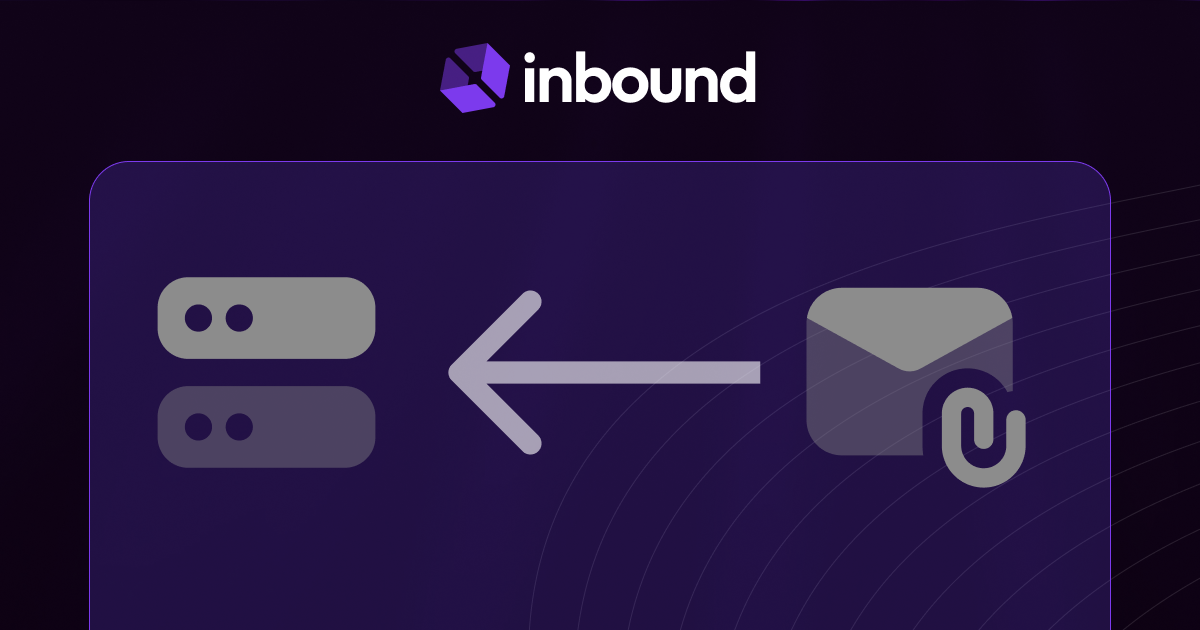September 6, 2025
The Next Frontier: Inbound Email APIs for Modern Applications
Why do you need inbound email?
Ryan Vogel
Founder & CEO

Email has long been the backbone of digital communication — but for most developers, email infrastructure has been a one-way street. We’ve had endless options for sending emails, but receiving them reliably has remained clunky, complex, and underserved.
With the rise of new announcements — including Resend’s upcoming private beta for inbound email — it’s clear the industry is waking up to this long-overlooked gap.
Why Inbound Email Matters More Than Ever
Modern apps aren’t just broadcasters — they’re listeners. Think about:
- Support automation: Turn any email reply into a ticket update.
- AI agents & workflows: Parse inbound email to trigger automations or summarizations.
- Customer feedback loops: Let users reply directly to notifications and have those replies routed to the right place.
The ability to receive email via API is quickly becoming table stakes. Developers shouldn’t have to spin up Postfix servers, parse MIME by hand, or worry about spam filtering.
The Problem With “Send-Only” Platforms
Until now, most developer-friendly email providers have focused on outbound messaging: SMTP, transactional email APIs, and event webhooks.
Receiving email has traditionally required:
- Custom mail servers & MX setup
- Complex parsing logic for multipart messages
- Manual spam detection and retries
- Attachment handling and storage
This is a high barrier for developers who just want to get structured JSON from an inbound email.
What the New Wave of Inbound APIs Must Deliver
The announcement of private beta programs like Resend inbound email is a signal: developers are asking for better tools. But a robust inbound email API must solve for:
- Webhooks + JSON: Parse subject, body, sender, attachments in a developer-friendly payload.
- Attachment Support: Files delivered with secure, signed URLs.
- Retries & Deduplication: No lost messages, no double processing.
- Spam & Abuse Filtering: Built-in protection without false positives.
- Simple Domain Setup: MX & SPF configuration that “just works.”
Anything less leaves teams back where they started — maintaining fragile email infrastructure.
inbound.new: Built for Developers Who Need Inbound Today
While the industry is moving toward inbound, we’re already there. inbound.new offers:
- End-to-end email infrastructure: Send, receive, and even reply programmatically.
- Webhook-first design: Get structured events with full message metadata.
- Attachment & MIME parsing out of the box.
- Developer experience focus: SDKs, clear docs, and easy domain verification.
No need to wait for limited betas — inbound.new is ready for production.
What to Watch in the Coming Weeks
With Resend’s inbound email beta on the horizon, the next few months will be exciting for the email API ecosystem. Here’s what to watch:
- Reliability: Will inbound delivery be fast and guaranteed?
- Completeness: How well do they handle attachments, edge cases, spam?
- Ease of Use: Can developers go live in minutes, not days?
The market is finally catching up to what developers have been asking for — bidirectional email infrastructure that is reliable, simple, and modern.
Final Thoughts
Inbound email is no longer a nice-to-have — it’s a core building block for support automation, AI-driven workflows, and customer engagement. The conversation is shifting, and developers have more choices than ever.
If you’re exploring how to receive email via API, check out inbound.new